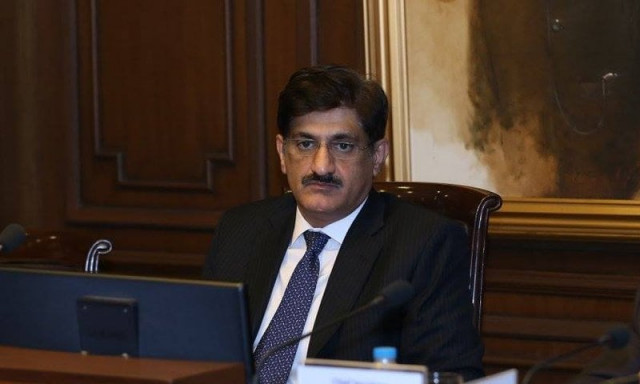CM Murad still not out of the woods over dual nationality
Despite rejection of disqualification plea, Sindh CM’s fate continues to hang in balance

Sindh CM Murad Ali Shah. PHOTO: PPP
There is a split among Supreme Court judges about the applicability of Article 62 (1) (f) of the constitution in the case of the Sindh chief minister on the account of holding dual nationality in the past.
If the constitutional provision (Article 62 (1) (f) is applied, Shah will be disqualified for life.
There are two rounds of litigation in the case. The first round started in the general elections 2013, wherein Shah’s nomination papers for a Sindh Assembly seat was rejected by the returning officer on the basis of the provisions of Article 62 (1) (d) (f). Later, Shah challenged the returning officer order in an election tribunal, which on April 16, 2013 held that he was a dual national therefore should be disqualified under Article 63 (1) (c ) of the constitution. Subsequently, the apex court on May 2, 2013 upheld the decisions of both the election tribunal as well as returning officer. Three months later, Shah on July 18, 2013 was able to obtain a certificate of reunification of his Canadian citizenship.
In the second round, Shah's nomination papers in the 2018 general elections were challenged before returning officer but the objection was rejected.
However, instead of filing an election petition, Roshan Ali Buriro filed a writ petition seeking the disqualification of the Sindh chief minister for life on the account of holding a dual nationality as was declared by the returning officer in the past.
However, the Sindh High Court on July 20, 2018, rejected that petition. Subsequently, the petitioner approached the apex court against the dismissal of his petition.
A three-member bench of the apex court, headed by Justice Umar Ata Bandial and comprising by Justice Muneeb Akhtar and Justice Yahya Afridi on January 23 this year also rejected the petition.
The apex court in its order noted that the returning officer was not a court of law to declare anyone disqualified for life.
However, Justice Yahya Afridi disagreed with the majority order and noted that the apex court on May 2, 2013, had upheld a returning officer’s order for Shah’s lifetime disqualification. The judge also referred to Justice (retd) Sheikh Azmat Saeed's two verdicts wherein it was stated that the matter of the disqualification of a public representative had to be addressed and checked, even if it required invoking suo motu jurisdiction under Article 184 (3) of the constitution. Justice Afridi also posed four questions for adjudication on the matter. However, the petition against Shah was rejected by a majority of 2-1.
The SC entertained the review petition and issued a notice to Shah.
Later, petitioner Roshan Ali filed a review petition against SC verdict.
A three-member bench led by Justice Sheikh Azmat Saeed and comprising Justice Umar Ata Bandial and Justice Ijaz ul Ahsan on August 6 noted that it appeared that various questions of law were identified by the petitioner needed to be addressed and adjudicated upon. The bench issued notices to all the respondents.
Interestingly, one member of bench, Justice Bandial, in his additional note wrote that the larger bench in its verdict had already held that a dual national candidate or elected member incurred disqualification under Article 63 (1) (c ) of the constitution which was limited to the election under dispute.
Justice Bandial also expressed concerns over the issuance of a notice to Shah by the bench in haste. The SC judge noted that the notice to the respondent was announced when he was asking some questions from the counsel for the petitioner.
"In my humble opinion, queries by the author of a judgment under review should be received happily because these can sharpen the point if any that deserves a review. Such focus is necessary otherwise; the review proceedings would become appellate proceedings. With respect, therefore, there was haste in passing the order of notice to the respondent," read the additional note.
A three-member bench led by Justice Umar Ata Bandial and comprising Justice Ijaz ul Ahsan and Justice Muneeb Akhtar on Thursday resumed the hearing of the review petition against the verdict that allowed Shah to contest the election.
During the hearing, Hamid Khan, the counsel for the petitioner, objected to the presence of Justice Muneeb Akhtar on the bench as he had decided the same matter as an SHC judge in 2013. The counsel sought his recusal. However, the objection was rejected.
Later, Khan said there was a difference of opinion among judges about the qualification of Shah, adding that one judge (Azmat Saeed) had already retired and the other (Justice Afridi) was not part of the bench.
The counsel requested the court to form a larger bench to hear the matter. However, Makhdoom Ali Khan, the counsel for the Sindh chief minister, rejected the plea for the formation of a larger bench to hear the case.
Later, the bench asked the counsel for the petitioner to satisfy the court as to why the formation of a larger bench was necessary and adjourned the case for two weeks.



















COMMENTS
Comments are moderated and generally will be posted if they are on-topic and not abusive.
For more information, please see our Comments FAQ